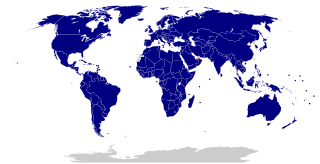
The diplomatic foreign relations of the United Arab Emirates are conducted by the Ministry of Foreign Affairs and International Cooperation.
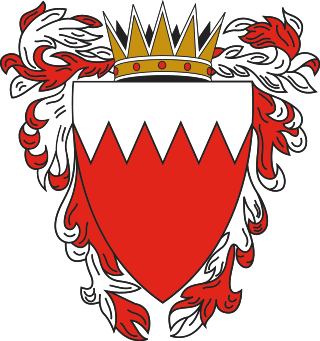
Bahrain plays a modest, moderating role in regional politics and adheres to the views of the Arab League on Middle East peace and Palestinian rights. Since achieving independence in 1971, Bahrain has maintained friendly relations with most of its neighbours and with the world community. It generally pursues a policy of close consultation with neighbouring states and works to narrow areas of disagreement.

The Cooperation Council for the Arab States of the Gulf, also known as the Gulf Cooperation Council, is a regional, intergovernmental, political, and economic union comprising Bahrain, Kuwait, Oman, Qatar, Saudi Arabia, and the United Arab Emirates. The council's main headquarters is located in Riyadh, the capital of Saudi Arabia. The Charter of the GCC was signed on 25 May 1981, formally establishing the institution.
This article deals with territorial disputes between states of in and around the Persian Gulf in Southwestern Asia. These states include Iran, Iraq, Kuwait, Saudi Arabia, Bahrain, Qatar, the United Arab Emirates (UAE), and Oman.

The relationship between the Russian Federation and the United Arab Emirates (UAE) stretches back to December 1971, when the Soviet Union and UAE broke off diplomatic relations. Relations between the two countries have been described as tense and a "somewhat strategic partnership", with the countries cooperating closely in Iraq, Egypt and Libya.

Malaysia–United Arab Emirates relations refers to foreign relations between Malaysia and United Arab Emirates. United Arab Emirates has an embassy in Kuala Lumpur, and Malaysia has an embassy in Abu Dhabi. Relations between the two countries are mainly in economic co-operation.

Canada—United Arab Emirates relations is used to describe the relations between the nations of Canada and the United Arab Emirates. Canada established relations with the United Arab Emirates in 1974. Each maintains an embassy in the other's capital.

Turkey and the United Arab Emirates share extensive cultural, military and economic ties, but relations have substantially deteriorated since Arab Spring, however, relations did start to recover in recent years.

France–United Arab Emirates relations are the foreign relations between France and the United Arab Emirates.

Since the independence of the United Arab Emirates from Britain in 1971, Egypt and the UAE relations were always at a good level and developing at an unprecedented rate. Egypt has an embassy in Abu Dhabi and consulate-general in Dubai while the UAE maintains an embassy in Cairo. The bond of friendship between the leaders of both countries has reflected on the growing political, economic and cultural ties between them, and as a result the UAE ranks first among Arab and foreign countries investing in Egypt. UAE and Egypt maintain a close economic ties and maintain trade between the two countries, with imports and exports between the two sides. The government of the UAE, by an order from Sheikh Khalifa bin Zayed Al Nahyan the President of UAE, gave Egypt cargo ships carrying 1,000,000 tonnes of wheat as a food gift to the people of Egypt. The UAE supported the 2013 Egyptian coup d'état and has since become Egypt's closest ally.

Relations have existed between Bahrain and Israel since Bahrain achieved its independence in 1971. In recent years, relations between the two countries have been thawing, and the countries agreed to establish diplomatic relations in September 2020. The foreign minister of Bahrain Khalid bin Ahmed Al Khalifa has been quoted saying "Israel is part of the heritage of this whole region, historically. So, the Jewish people have a place amongst us." The common threat of Iran has provided common ground for a thaw in what were once tense relations. Bahrain's foreign policy traditionally supports the creation of an independent Palestinian state.
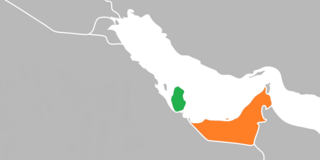
Qatar and the United Arab Emirates (UAE) share a naval border and are part of the Arabic-speaking Persian Gulf region. They are both members of the GCC.

Somalia–United Arab Emirates relations are bilateral relations between Somalia and the United Arab Emirates (UAE). Both nations are Arab League members and engage in close development cooperation. Somalia also has an embassy in Abu Dhabi, and the UAE maintains an embassy in Mogadishu.
The Embassy of Canada to the United Arab Emirates is Canada's diplomatic mission to the United Arab Emirates. The embassy is located on the 9th and 10th floors of the West Tower of the Abu Dhabi Trade Center, next to Abu Dhabi Mall.
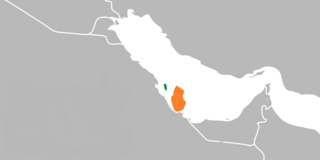
Bilateral relations exist between the State of Qatar and the Kingdom of Bahrain. They first began in 1971.
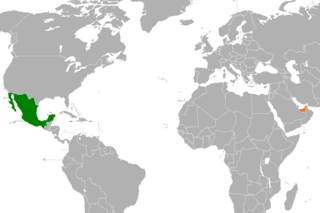
Mexico–United Arab Emirates relations are the diplomatic relations between Mexico and the United Arab Emirates. Both nations are members of the United Nations.

The Bahrain–Israel normalization agreement, officially Abraham Accords: Declaration of Peace, Cooperation, and Constructive Diplomatic and Friendly Relations, is an agreement to normalize diplomatic and other relations between Bahrain and Israel. The agreement was announced by President Donald Trump on September 11, 2020, and followed on from a joint statement, officially referred to as the Abraham Accords, by the United States, Israel and the United Arab Emirates (UAE) on August 13, 2020. It was formally signed on September 15, 2020, at the White House in Washington, D.C., and made Bahrain the fourth Arab state to recognize Israel and the second within a month.

Polish-Emirati relations are foreign relations between the Republic of Poland and the United Arab Emirates. Poland has an embassy in Abu Dhabi, and the United Arab Emirates has its counterpart in Warsaw.


















